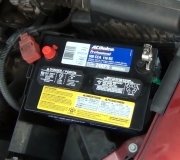Everything you found suggests there are two or more shorted diodes in the alternator and the unit will have to be replaced. Diodes are one-way valves for electricity. There are two sets of three of them. When one diode in each set shorts, there is a direct path to ground through them which would melt the output wire. Older cars used a fuse link wire that was soldered in part of the wiring harness. Yours should have a large fuse bolted in the under-hood fuse box.
When the fuse is blown, you will not have battery voltage on that output terminal. With the engine running, the shorted diodes will let the very high current run back and forth wide open inside the alternator rather than being directed in one direction out to the battery. It takes 0.5 to 0.6 volts before a diode will turn on and conduct in the forward direction, and since they work in pairs, that's why you are still getting 1.2 volts at the output terminal. Once the turn-on voltage is reached and the good diodes start to conduct the current, it immediately goes backwards through the shorted diodes instead of to the battery. That high current is why it gets hot.
Intermittent output is caused by worn brushes which can be replaced easily, often without removing the alternator from the engine, but diodes are a different story. Because of the high current and the very low failure rate, they are soldered in and are relatively difficult to replace. That's why you're better off replacing the whole alternator and fuse.
Caradiodoc
Thursday, May 13th, 2021 AT 10:39 AM


